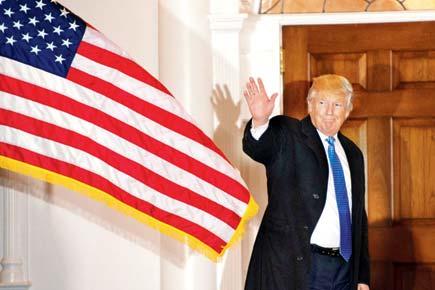One of the most pressing global concerns is that if the President-elect introduces radical policy changes, he could upend the world order


President-elect Donald Trump waves to the media at the Trump National Golf Club in Bedminster, New Jersey on Sunday. Pic/AFP
ADVERTISEMENT
 Halifax, a major port in the east coast of Canada, has hosted an annual security forum for the past nine years. This year, the event was held a week after the US Presidential elections that delivered a stunning verdict in favour of Donald Trump.
Halifax, a major port in the east coast of Canada, has hosted an annual security forum for the past nine years. This year, the event was held a week after the US Presidential elections that delivered a stunning verdict in favour of Donald Trump.
Since most of those who attend the forum are people who deal with security issues — officials current and retired, policy wonks, media commentators, military officers —the subject of almost every discussion was the forthcoming Trump presidency, and in view of his positions, the future of NATO, Canadian-American relations, and the role of Russia.
Uniquely, the Halifax Forum hosts only people from democracies around the world, principally the Atlantic region, but also Japan and other parts of the world. The presence of a strong bipartisan US delegation — comprising of luminaries like Senator John McCain, the losing Vice Presidential candidate Tim Kaine, Senators Dan Sullivan and Jeanne Shaheen, PACOM chief Admiral Harry Harris, the controversial head of the National Security Agency, Admiral Mike Rogers — provided the backdrop to the discussions.
In the fabled American policy community — the Beltway elite of Washington DC — as it were, there is a sense of alarm, and even panic at what the Trump presidency would be like. Some measure of it comes from the fact that many of them opposed Trump, and some from the fact that they may have lost possible appointments in the incoming administration. But it is couched in laments about the coming collapse of the liberal order.
Discussion focused on a range of issues such as the future of democracy to whether Trump’s attack on alliance partners for ‘free loading’ and his relationship with Vladimir Putin presaged a new and difficult era for the US-led alliance system in the Pacific and the Atlantic. Many issues were posed as questions: Will Trump make a deal with Russia, getting it to back off in Ukraine in exchange for giving it a free hand in Syria? Would the Americans walk away from the Asia Pacific and Atlantic alliances? What would happen to the world order and rules based international system that the US had created and led for 70 years?
The message from the top American interlocutors was that as of now, the US was firmly committed to the alliances and that the reality of office would push Trump back to the centre of the political spectrum. Analysts offered a range of reasons why things may not change that much: US has enduring interests which will not change. If Trump deviated from fostering them, he would be brought to heel very soon by the US Congress and the people. Other Presidents, too, speakers recalled, took radical postures before they assumed office, but moderated their stance thereafter.
But that almost appeared to be more by way of wishful thinking. The appointment of outliers like Lt Gen Michael Flynn as national security adviser, Jeff Sessions as Attorney General, Mike Pompeo as CIA chief, and Stephen Bannon as the chief strategist, signal that Trump aims to do what he said he would do.
Host Canada expressed its worries about the upending of the deep security and economic links between the two countries. An aggressive protectionist approach of the Trump administration could target some key Canadian exports like softwood, lumber and livestock. The US would seek tighter IPR rules which would affect not just Canada, but countries like India as well. Canadians haven’t forgotten that the US actually shut its borders with Canada in the wake of 9/11, signalling that when it came to security, homeland US came first. Till then, many Canadians had believed that North American security was integrated.
Among those eagerly watching the situation are the Japanese. They are heartened by the recent meeting between the US President-elect and the Japanese prime minister Shinzo Abe. Trump’s attitude towards America’s foreign commitments will have a major impact on Japan. He has given confusing signals, alternately calling for the US to pull out from its Japanese and Korean commitments, to suggesting — and then denying that he did so — that Japan and South Korea ought to develop their own nuclear weapons. The details of the Abe-Trump meeting are not known and, as for South Korea, it has been reassured by the NSA-designate Gen Flynn that the US valued its alliance with them and remained committed to dealing with North Korean nuclear weapons.
But so far, there has been little on the European and North American front. No senior leader or delegation has met Trump and the President-elect remains silent on the issues that the Europeans fret about. Any radical shift of policy here could actually upend the world order as we know it, considering that it is the America-Western Europe combine which has had preponderant economic and political clout to enforce it.
As for other regions like South Asia, ASEAN, West Asia or Africa, there is little talk. Trump appears to be unfamiliar of the world outside his own country, Europe and Japan. Perhaps it is all for the good.
The writer is a Distinguished Fellow, Observer Research Foundation, New Delhi. Send your feedback to mailbag@mid-day.com
 Subscribe today by clicking the link and stay updated with the latest news!" Click here!
Subscribe today by clicking the link and stay updated with the latest news!" Click here!






